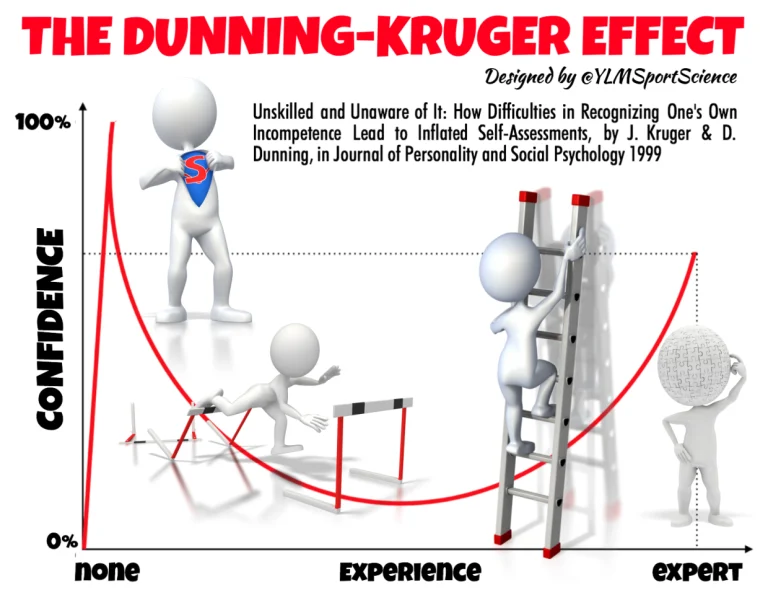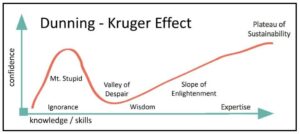In this world, there are people who underestimate themselves despite having excellent abilities and experiences, and who overestimate themselves with self-confidence that comes from nowhere, even though they don’t have enough skill/experiences, and look down on others. The “Dunning-Kruger effect”, which was elucidated by psychologists Dunning and Kruger, is recognized worldwide in society including workplace. In this article, I’d like to explain briefly what the Dunning-Kruger effect is and how to use it in workplace and home with some examples.
What is the Dunning-Kruger effect?
The Dunning-Kruger effect is a type of cognitive bias in which people believe they are smarter and more capable than what they actually are. Essentially, low-ability people do not possess the skills needed to recognize their own incompetence. The combination of poor self-awareness and low cognitive ability leads them to overestimate their capabilities.
Definition of the Dunning-Kruger Effect
In 1999, Professors Dunning and Kruger published the paper “Unskilled and unaware of it: how difficulties in recognizing one’s own incompetence lead to inflated self-assessments.” They prove the phenomenon that people with very little knowledge on a particular subject are confident and outspoken on the subject. This lack of knowledge leads to two things: Firstly, you have little idea of what you are actually doing or talking about, and secondly, your sense of confidence makes it impossible for you to realize just how little you know. The Dunning-Kruger effect was shown in a paper in 1999 and received the Ig Nobel Prize in 2000, attracting worldwide attention.
Confucius, Socrates and Shakespeare, who are called the Saints of the World, have left words that lead to the Dunning-Kruger effect, such as, “Authentic knowledge is to know one’s ignorance.”
Dunning Kruger Curves
The Dunning Kruger curve is an expression of confidence and wisdom. The vertical represents confidence and the horizontal represents wisdom. As your wisdom maturity increases, you will find that your confidence fluctuates.
- When you get a little bit of wisdom for the first time, you feel like you’ve completely understood it and you’re full of yourself, “I’m excellent!” “This stage is also known as the Peak of ‘Mount Stupid’.
- As you learn a little more, you realize the scale of the whole and lose your confidence, saying, “I don’t understand anything.” Also known as the “Valley of Despair”.
- As you progress further in your learning, you will feel that you have grown, and you will begin to gain confidence that you have understood a little more than before. This stage is also known as the “Slope of Enlightenment”.
- As you learn further, your wisdom will mature and you will be able to make accurate self-evaluations, saying, “I am good at this, but I am not good at that.” This stage is also known as the “Plateau of Sustainability”.
The Dunning-Kruger effect is particularly focused on the state of 1.”I am excellent”. In spite of your low wisdom, experience, and abilities, you are blind and full of confidence (overestimate yourself). Knowing the fact that you don’t know about it (acknowledge of ignorance) becomes important.
What happens with the Dunning-Kruger effect
The Dunning-Kruger effect causes communication problems when there is a discrepancy in evaluation between yourself and others. For examples, even if you say sarcasm to someone with low ability, they will not perceive it as sarcasm due to the Dunning-Kruger effect. They take sarcasm purely as a compliment. As a result, various things happen.
Overestimate yourself
For examples, a beginner driver who has just obtained a driver’s license recognizes their low ability and drives carefully at first. However, the results show that drivers who have become accustomed to driving after three to five years are more likely to misjudge their own driving skills and cause accidents due to their overestimate driving skill. This is due to the Dunning-Kruger effect.
Lack of knowledge
The less capable people are, the more they are under the illusion that they have knowledge, even though they lack the essence of the whole of knowledge. They don’t think the need to increase their knowledge anymore because they think that their knowledge is sufficient. On the other hand, competent people, who is lower self-esteem, say, ‘’The people around me must have as much knowledge as I do. I still lack knowledge.” Then, they keep learning.
Inability to evaluate others properly
Self-evaluation is influenced by the reactions of others and those around you. Therefore, people, who have a wrong self-evaluation, may have a wrong evaluation for the others. For examples, if the boss who evaluates his subordinates falls into the Dunning-Kruger effect, he will not be able to evaluate his subordinates correctly. This means that the boss might evaluate subordinates unfairly low or high despite of their incompetence.
Tendency to be gullible
People with overestimate are more likely to be scammed and deceived. It’s not uncommon for young successful people to fall prey to the Dunning-Kruger effect and get scammed out of big bucks. This kind of thing happens because we are overestimated themselves saying, “I am successful, so I can’t be deceived, and my judgment is always correct.”
Unable to cope with difficulties
Due to their over self-esteem, they are unable to respond when they face with difficulties or obstacles. This is because there is a big gap between self-perception and reality. People with unfounded self-confidence tend to be willing to face challenges and obstacles. However, when they realize that they don’t have the ability to overcome it, they can’t accept the fact.
It is said that the cause of the Dunning-Kruger effect is the lack of cognitive ability to judge oneself correctly and objectively. Feedback from others is important points for self-reflection, so it is very important for people to work in society and interact with others.
How can it be used in a workplace?
According to the “Dunning-Kruger Effect”, being overconfident and being humble are common human psychology. We can take advantage of this effect in the workplace and at home in order to develop self-growth.
How to manage people who are overestimate themselves
A person who has become overestimated is in a state of thinking, “I’m a great guy” without any basis. They are overconfident in their abilities and in a positive state. First of all, let’s provide chance and challenge. As a result, they won’t go well. Therefore, it’s important to provide feedback them for the next stage by making them realize why they can’t do it.
The point is to give feedback on both positive points and negative points. It makes them think about why it didn’t work. Never say negative words such as “Don’t get carried away”. You will need a lot of patience, however when they become mature someday, they’ll understand your generosity.
How to manage people who are underestimate themselves
Unlike when you were young and didn’t know anything, mid-career people who are cautious with enough knowledge and experience should be praised their small successes. Create opportunities for those in order to make other members understand their value. They will recover their confidence. Provide the activity field little by little by matching their ability and self-evaluation.
Summary
- The Dunning-Kruger effect refers to self-evaluation higher than overestimation.
- Give chances to people who are overestimated and make them realize correct self-evaluation from failure.
As people get older, they experience that things don’t go their way. Also, whether you like it or not, it takes a long time to realize how difficult it is to carry out your daily missions with right self-evaluation. Regardless of age, humility encourages growth. The Dunning-Kruger effect reminds us of what is important in life.




コメント